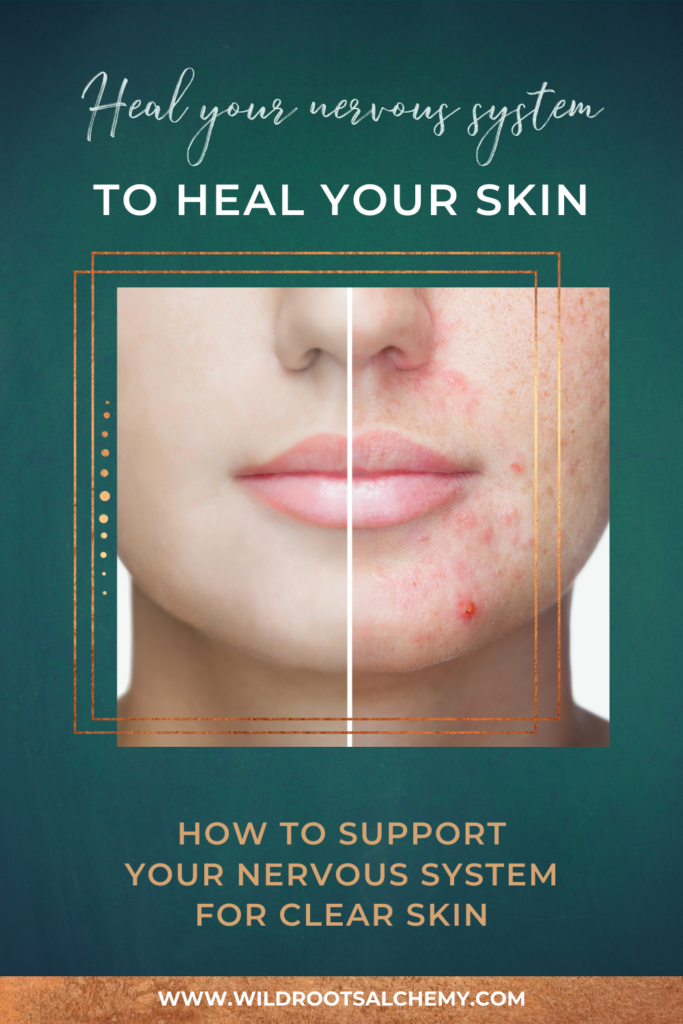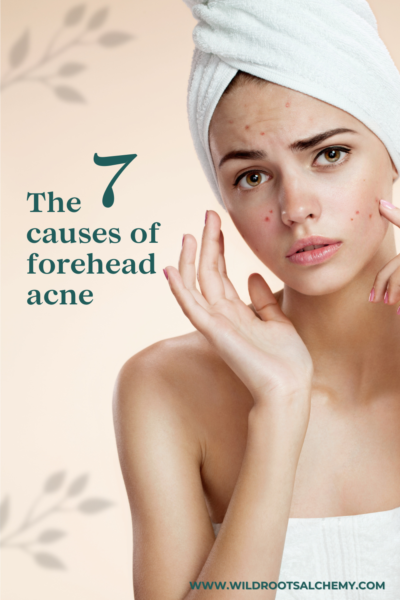
As a naturopathic doctor who treats acne, I’m always looking to address the root cause.
Yet with acne (and most other chronic conditions), there’s more than just a single root cause. Acne is what we would call a “multifactorial” condition, meaning that there are often several causes at play. (But ohhh, how I wish it were so simple that we could narrow it down to just one!)
If you keep digging into the mechanisms behind acne, you’ll find that the nervous system plays a major role in the development of acne.
This is because your nervous system is the key regulator of your endocrine (hormonal) and immune systems. Your nervous system directly impacts the production of hormones involved in acne, like estrogen, progesterone, and androgens, as well as cortisol and insulin.
Your nervous system also impacts the function of your immune system, which means that the health of your nervous system plays a big part in how your body manages inflammation and its interactions with your microbiome (including that infamous P. acnes bacteria that’s associated with acne).
What’s this really mean? This means that dysfunction in your nervous system can lead to hormone imbalances, blood sugar issues, and inflammation—all of which contribute to acne.
So in order to heal your skin, your nervous system health must be addressed!
Nervous System 101
Before we get into how to heal your nervous system, let’s first briefly talk about its basic parts and functions.
Your nervous system is comprised of 2 main parts:
- Central nervous system (brain and spinal cord)
- Peripheral nervous system (all the nerves outside of the brain and spinal cord)
The peripheral nervous system is also divided into 2 parts: your somatic nervous system (which gives you the ability to flex those muscles of yours) and your autonomic nervous system. We’ll be focusing on the autonomic nervous system in this article.
The Autonomic Nervous System’s Role in Acne
Your autonomic nervous system is what controls your internal organs and bodily functions, like your heart rate, breathing rate, digestion, metabolism, urination, defecation, and sexual response. It’s called the “autonomic” nervous system because these processes act “automatically” without your conscious awareness.
The autonomic nervous system is made up of 2 parts (again with that 2 parts!):
- Parasympathetic nervous system (“rest-and-digest”)
- Sympathetic nervous system (“fight-or-flight”)
Your autonomic nervous system receives information from your environment, and either stimulates or inhibits certain bodily processes. This is based on whether your body perceives you to be in danger or not.
When you feel relaxed and at-ease, you’re in a predominantly parasympathetic state. Your body assumes that you’re not in danger, and it sends all its resources to keep you in a rested state. The parasympathetic response promotes relaxation, stimulates digestion, aids cellular regeneration and tissue repair, and supports healthy metabolism.
On the other end, whenever you feel stressed out or in a state of fear and anxiety, you’re in a predominantly sympathetic state. The sympathetic nervous system response assumes that you’re in danger and prepares your body to either “fight” or run away (“flight”).
How does this work? Your brain sends a signal to your adrenals to start producing adrenaline and cortisol (stress hormones). These hormones create a cascade of effects in your body that prepare it to respond to danger, including increased heart rate, elevated blood pressure, and a sudden release of stored sugar and fat for an energy boost.
The sympathetic nervous system also inhibits bodily processes that are activated by the parasympathetic nervous system (like digestion and hormone metabolism) because these processes aren’t important in emergency situations. Yet these bodily processes that are slowed down by your sympathetic nervous system are incredibly important for healthy, clear skin and balanced hormones!
When you’re dealing with chronic stress, fear, worry, or anxiety, this means that your sympathetic nervous system is overly activated—and this imbalance is at the root of your acne and hormone imbalances!
The Autonomic Nervous System: Where the Healing Magic Lies!
To heal your skin, you need to address your nervous system: specifically, your parasympathetic (“rest-and-digest”) nervous system. Activating the parasympathetic nervous system is a key part of healing your skin, and something I focus on extensively in my Naturally Radiant Skin Program.
There are many ways to support your parasympathetic nervous system health, including self-care practices, key nutrients, and helpful plant medicine allies. Here are a few recommendations for healing and supporting your nervous system:
How to Heal and Nourish Your Nervous System
1) Address your thoughts, beliefs, and emotions
Much of our day-to-day stress is in our heads. And no, that isn’t to say we’ve gone off the deep end! It’s a totally normal part of being a human, yet part of our “job” here on Earth is learning how to master our mental chatter and emotions, so that we can tap into real joy and live a more authentic life in alignment with the truth of who we are. Accomplishing this is a lifelong journey, but it’s the only true path to health and well-being!
To sum it up: Learning how to harness the power of your mind is a crucial aspect to healing your skin, or anything for that matter.
Take a look at your everyday thoughts. Do you constantly think about things that upset you, stress you out, make you worry, or do you focus on the worst-case scenario? Are you someone who has a lot of negative self-talk?
Your brain can’t differentiate between a perceived threat (like the stressful thoughts you’re thinking) versus a real threat or emergency situation. Stressful thoughts, negatives beliefs about yourself, and negative emotions are going to trigger your sympathetic nervous system, keeping you in a constant state of “fight-or-fight.”
To heal your skin, you need to support your nervous system by rewriting your thoughts, reframing your beliefs, and healing your emotions. (I write more about this topic here.)
2) Improve your response to stress with nourishing self-care practices
There are many ways to improve your response to stress in your day-to-day life; you just need to find the ways that work for you!
Here are some examples to get started:
- Spending time out in Nature: putting your bare feet on the ground, getting fresh air and sunshine, breathing in the scents of the forests and flowers, playing in the rivers and creeks
- Movement: hiking, walking, yoga, tai chi
- Meditation
- Breathwork
- Warm baths
- Journaling
- Good sleep
- Dancing to music
- Singing, laughing, chanting
- Eating healthy, nutrient-dense foods and cutting out processed foods, soda, and other foods that stress out your body
3) Mindful eating
To support the “rest-and-digest” parasympathetic nervous system, focus on making meals a time for you to fully tap into the present moment!
Put away all distractions: no scrolling on your phone, no TV, no reading. Just focus on the food in front of you. Before you take your first bite, take a few deep breaths and hone in on the smell of your food. This activates key parts of your parasympathetic nervous system to start producing saliva and other digestive secretions.
Take your first bite of food. Focus on the food’s taste and texture. Then you want to make sure you chew each bite 20-30 times. (It helps to place your utensil down in between bites).
The point of mindful eating is to really savor your food! This keeps you in a parasympathetic state and it’s the best way to optimize your digestion, especially if you have any gut issues.
Start implementing the strategies outlined above to restore a healthy nervous system–and you’ll be on your way to clear skin in no time!





